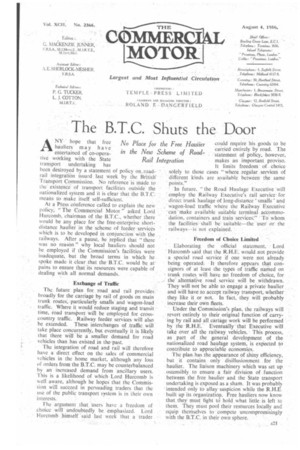The B.T.C. Shuts the Door
Page 23

If you've noticed an error in this article please click here to report it so we can fix it.
ANY hope that free hauliers may have entertained of co-operative working with the State transport undertaking has been destroyed by a statement of policy on, roadrail integration issued last week by the BritishTransport Commission. No reference-is made to the existence of transport facilities °inside the nationalized system and it is clear that the B.T.C. ;. means to make itself self-sufficient.
At a Press conference called to explain the new policy, "The Commercial Motor" asked Lord Hurcomb, chairman of the'B.T.C., whether there would be any place for the free-enteiprise.shortdistance haulier in the scheme of feeder-services which is to be developed in conjunction with -the railways. After a pause, he replied that " there was no reason" why local hauliers should not be employed if the Commission's facilities were inadequate, but the broad terms in which he spoke made it clear that the B.T.C. would be at pains to ensure that its resources were capable of dealing with all normal demands.
Exchange of Traffic The future plan for road and rail provides broadly for the carriage by rail of goods on main trunk routes; particularlY smalls and 'wagon-load traffic. Where it would reduce staging and transit time, road transPort Will be employed for crosscountry traffic.. Railway feeder services will also be extended. These interchanges of traffic. will take place concurrently, but eventually it is likely that there will be a smaller demand for road vehicles than has existed in the-past.
The integration of road and rail will therefore have a direct effect on the sales of commercial vehicles in the home market, although any loss of orders from the B.T.C. may be counterbalanced by an increased demand from ancillary users. This is a likelihood of which Lord Hurcomb is well aware, although he hopesthat the Commission will succeed in persuading traders that the use of the public transport system is in their own interests. '
The argument that users have a freedom of choice will undoubtedly be emphasized. Lord Hurcomb himself said last week that a trader could require his goods to be carried entirely by road. The stateraent of policy, however, makes an important proviso. It limits freedom of choice solely to those cases "Where regular services of different kinds are available between the same ' points." Infuture. "the Road Haulage Executive will employ the Railway Executive's rail :servicefor direct trunk haulage of long-distance 'smalls' and ; wagon-load traffic where the Railway Executive -carr make available suitable terminal accommo' datien, containers and train "serviceS:" ' T6 whom the facilities shall be suitable—the 'user or the railways—is not explained. • Freedom of Choice Limited ' Elaborating the official statement. Lord Hurcomb said that the R.H.E. wouldnot provide • a special road service if one were not already being operated: It therefore appears that consignors of at least the types of traffic naMed on , trunk routes will have no freedom of choice, for .the" alternative road service will be withdrawn. They will 'not be able to engage a private haulier and Will have .to accept railway transport, whether they like it or not. In -fact, they will probably increase their own fleets.
Under the Commission's plan, the railways will revert entirely to their original function of carrying by rail and all carthge work will be performed by the R.H.E. Eventually' that Executive will take over all the railway, vehicles. This process, as part of the general development of the nationalized road haulage system, is expected to contribute to appreciable economies.
The plan has the appearance of shiny efficiency, but it contains only disillusionment for the haulier. The liaison machinery which was set up ostensibly. to ensure a fair division of function between the free haulier and the State transport undertaking is exposed as a sham. It was probably intended only tO allay suspicion while the R.H.E. built up its organization. Free hauliers now know that they must fight t8 hold what little is left to them. They Must pool their resources locally and equip themselves to compete uncompromisingly with the B.T.C. in their own sphere.




















































































